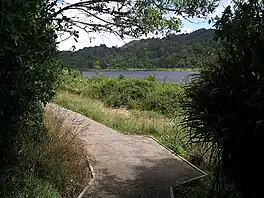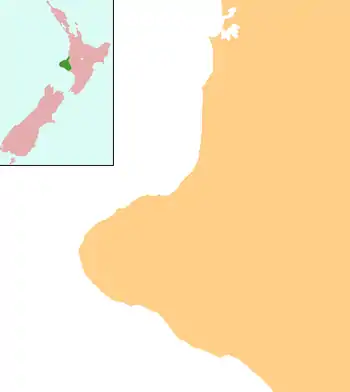Lake Rotokare
Lake Rotokare is a landslide dammed lake[1] in the New Zealand region of Taranaki. It is located 12 km (7.5 mi) east of Eltham.[2]
| Lake Rotokare | |
|---|---|
 Lake Rotokare | |
 Lake Rotokare | |
| Location | Taranaki, North Island |
| Coordinates | 39.45°S 174.41°E |
| Primary inflows | springs |
| Primary outflows | Te Ararata Stream |
| Basin countries | New Zealand |
| Surface area | 17.8 ha (44 acres) |
| Average depth | 6 m (20 ft) |
The 230 ha (570 acres) Scenic Reserve, in the Tangahoe catchment, is the country's largest wetland and lake habitat inside a predator proof fence. It is administered by South Taranaki District Council and Rotokare Scenic Reserve Trust. Species in the Reserve include raupō, flax, purei, makura, pukatea, kahikatea, coprosma, swamp maire, water millet, jointed baumea, Australasian bittern, spotless crake, fernbird, gold striped gecko, banded kōkopu, koura, and short and long-finned eel.[1]
Lake Rotokare should not be confused with Barrett Lagoon near New Plymouth, which has the alternative Māori language name of Rotokare.
History
The Reserve was created in the early 1870s.[1] Road access was created in 1914.[3] In 2008, the Rotokare Scenic Reserve Trust completed construction of a predator proof fence around the reserve.[2]
Reintroduction of native bird species
A number of bird species have been reintroduced into the reserve:
- Western Brown Kiwi (Apteryx mantelli) in 2012
- Tīeke/saddleback and pōpokatea/whitehead in May 2014.[4]
- Hihi (Stitchbird) in 2017 with additional birds added to the population in 2018.[5]
- Pāteke (Brown Teal) in May 2019.[6]
- Titipounamu (Rifleman) in 2019[7]
References
- "Freshwater bodies of outstanding or significant value in the Taranaki region" (PDF). Taranaki Regional Council. 2016.
- Taranaki - a walker's guide. Venture Taranaki.
- "ROTOKARE LAKE (Hawera & Normanby Star, 1914-03-10)". paperspast.natlib.govt.nz National Library of New Zealand. Retrieved 6 March 2017.
- "Tieke and Popokatea Translocation". www.rotokare.org.nz. Retrieved 18 March 2022.
- Martin, Robyn (16 April 2018). "Hihi breed in Taranaki for first time in 130 years". Radio New Zealand website. Retrieved 30 May 2019.
- Watson, Mike (15 May 2019). "Wildlife sanctuary to release endangered native duck during shooting season". Stuff. Retrieved 28 May 2019.
- "Sixty titiponamu moved from Egmont National Park to Lake Rotokare Sanctuary". Stuff. 26 April 2019. Retrieved 29 March 2022.